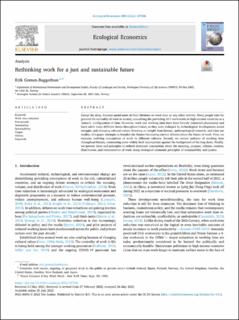Rethinking work for a just and sustainable future
| dc.contributor.author | Gomez-Baggethun, Erik | |
| dc.date.accessioned | 2023-02-28T13:18:21Z | |
| dc.date.available | 2023-02-28T13:18:21Z | |
| dc.date.created | 2022-08-28T13:05:58Z | |
| dc.date.issued | 2022 | |
| dc.identifier.citation | Ecological Economics. 2022, 200:107506 1-10. | en_US |
| dc.identifier.issn | 0921-8009 | |
| dc.identifier.uri | https://hdl.handle.net/11250/3054708 | |
| dc.description.abstract | Except for sleep, humans spend more of their lifetimes on work than on any other activity. Many people take for granted the centrality of work in society, conceiving the prevailing 40 h workweeks in high-income countries as a ‘natural’ configuration of time. However, work and working time have been fiercely contested phenomena and have taken many different forms throughout history as they were reshaped by technological development, social struggle, and changing cultural values. Drawing on insight from history, anthropological research, and time use studies, this paper attempts to broaden the frames harnessing current debates about the future of work. First, we examine evolving conceptions of work in different cultures. Second, we review patterns of working time throughout history, contrasting some widely held assumptions against the background of the long dur´ee. Finally, we present ideas and principles to rethink dominant conceptions about the meaning, purpose, volume, content, distribution, and remuneration of work along ecological economic principles of sustainability and justice. Work time reduction Post-growth Automation Sustainability Utopia History Degrowth | en_US |
| dc.language.iso | eng | en_US |
| dc.rights | Navngivelse 4.0 Internasjonal | * |
| dc.rights.uri | http://creativecommons.org/licenses/by/4.0/deed.no | * |
| dc.subject | Work time reduction | en_US |
| dc.subject | Post-growth | en_US |
| dc.subject | Automation | en_US |
| dc.subject | Sustainability | en_US |
| dc.subject | Utopia | en_US |
| dc.subject | History | en_US |
| dc.subject | Degrowth | en_US |
| dc.title | Rethinking work for a just and sustainable future | en_US |
| dc.title.alternative | Rethinking work for a just and sustainable future | en_US |
| dc.type | Peer reviewed | en_US |
| dc.type | Journal article | en_US |
| dc.description.version | publishedVersion | en_US |
| dc.rights.holder | © 2022 The Authors | en_US |
| dc.subject.nsi | VDP::Samfunnsøkonomi: 212 | en_US |
| dc.subject.nsi | VDP::Economics: 212 | en_US |
| dc.source.pagenumber | 1-10 | en_US |
| dc.source.volume | 200:107506 | en_US |
| dc.source.journal | Ecological Economics | en_US |
| dc.identifier.doi | 10.1016/j.ecolecon.2022.107506 | |
| dc.identifier.cristin | 2046474 | |
| dc.source.articlenumber | 107506 | en_US |
| cristin.ispublished | true | |
| cristin.fulltext | original | |
| cristin.qualitycode | 1 |
Tilhørende fil(er)
Denne innførselen finnes i følgende samling(er)
-
Publikasjoner fra CRIStin - NINA [2364]
-
Scientific publications [1392]
Vitenskapelige artikler, kapitler og monografier i Open Access.

